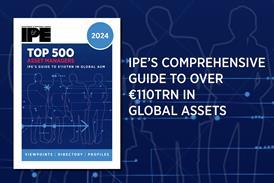ESG Special Reports – Page 7
-
 Special Report
Special ReportPensionDanmark: Real-world impact and active ownership
The fund bases its ESG investments on engagement, screening and active ownership
-
 Special Report
Special ReportBT Pension Scheme: Ambitious 2035 net-zero target
The pension scheme has set itself a series of tough climate objectives
-
 Special Report
Special ReportBorder to Coast: Climate solutions provider for the public sector
The asset pool has released a standalone climate-change policy to meet net zero
-
 Special Report
Special ReportPFA Pension: First interim target is ‘ambitious but realistic’
The pension provider is decarbonising its portfolio one asset class at a time
-
 Special Report
Special ReportInarcassa: Continuous carbon reduction targets
The fund is embracing thematic investments and Paris-aligned benchmarks
-

-
 Special Report
Special ReportCarbon price: Dear greenhouse gases
Global carbon markets are expanding as prices increase, with consequences both for companies and their investors
-
 Special Report
Special ReportIn search of an ESG standard in a sea of ESG ‘standards’
International Financial Reporting Standards (IFRS) and US Generally Accepted Accounting Principles (GAAP) have given us the tools to compare and evaluate revenue streams from vastly different sectors and industries. For example, we can calculate and contrast a firm that sells agricultural products in Germany vs. a firm that offers cloud computing services in Singapore.
-
 Special Report
Special ReportFuture proof: impact investing
Impact investing is trending. The International Finance Corporation (IFC) estimates that investor appetite could grow to USD 26 trillion, with as much as USD 5 trillion of that in private markets. Looking at the market size of impact investing, the Global Impact Investing Network (GIIN) currently estimates that it was USD 715 billion at the end of 2019, with private debt attracting the highest capital allocation (34%). The huge gap between potential demand and the current market size shows that there is great potential for the impact investing market to grow.
-
 Special Report
Special ReportDebunking 7 misconceptions about scope 3 emissions
In this investment viewpoint we describe seven key misconceptions that we think may have deterred investors from fully integrating considerations linked to scope 3 emissions and lead to confusion in the market.
-
 Special Report
Special ReportMeasuring a country’s carbon emissions: A debate with high stakes
As the effects of climate change become increasingly apparent—from rising sea levels to more frequent and devastating natural disasters—the need for action becomes more urgent by the day. Environmental responsibility has permeated all sectors of the financial industry. In particular, asset managers have seen increasing interest from clients, regulators and the general public to facilitate this effort by directing financial flows toward entities that make better environmental citizens.
-
Special Report
Net Zero and Just Transition for Pension Funds
The Conference of the Parties (COP) 26 in Glasgow represents a new milestone in the global fight against climate change, with a more climate-friendly US administration and growing mobilisation in favour of “Net Zero”. Six years on from the Paris agreement, the objective is clear: limiting temperature rise to well below 2°C above pre-industrial averages, which means reaching net-zero carbon emissions by 2050, and halving them by 2030.
-
 Special Report
Special ReportThe global race to net zero
Leading global asset managers aiming to achieve net zero greenhouse gas emissions by 2050
-
 Special Report
Special ReportWhat makes an “impact” investment manager?
Understanding the required foundation to build, manage, and measure an impact portfolio.
-
 Special Report
Special ReportInsurance Linked Securities: developing climate resilience
Insurance Linked Securities (ILS) are an alternative asset class where investors’ returns are primarily linked to the occurrence of natural catastrophes. Since the majority of exposures emanate from climate-related risks, the potential impact of climate change is a key consideration for ILS managers and investors. In parallel, ILS is receiving increased recognition for its inherent ESG-positive characteristics with the critical role insurance plays in helping society develop long-term resilience.
-
 Special Report
Special ReportUnravelling the conflicts in ‘Double Materiality’
Where do you draw the ‘moral’ line and how do you have a genuinely positive impact?
-

-
 Special Report
Special ReportLong-term investors absolutely cannot afford to function without a Climate lens (and why that may not be enough)
Sponsored Commentary from Morgan Stanley
-
 Special Report
Special ReportThe wheat and the chaff: Man Group’s case study in rating an RI Fund
As responsible investing becomes default best practice, it is increasingly important that allocators can separate the wheat from the chaff, distinguishing genuine responsible investment managers from those that greenwash. Below, we provide a case study that sets out the best practices for allocators.
-
 Special Report
Special ReportTurning Net Zero pledges into action
In the run-up to COP26, Net Zero pledges have become increasingly ubiquitous. Over 100 countries, including China, the U.S. and the EU, have pledged to become Net Zero. Further, over 100 local governments, nearly 1000 cities and 20003 businesses pledged to operate at Net Zero. Net Zero is now also the trillion dollar challenge for investors. The Net Zero Asset Owner Alliance and the Net Zero Investment Framework have embarked to build Net Zero portfolios.





